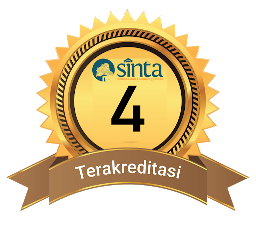Eligibility of Student Worksheet (LKPD) Based on 5e Learning Cycle With Science Process Skills (SPS) on Acid-Base Material
DOI:
10.29303/cep.v4i1.2393Published:
2021-05-29Issue:
Vol. 4 No. 1 (2021): Edisi MeiArticles
Downloads
How to Cite
Abstract
This study aims to measure the eligibility of a developed learning media. The media is a student worksheet (LKPD). The LKPD being developed is LKPD with a process of science skills based on the 5E Learning Cycle in acid-base material. This type of research is descriptive quantitative research using the ADDIE model. Researchers used a validation sheet as a validation instrument. The validation was carried out by three experts in chemistry education. The validation aspects that are assessed are aspects of content, presentation, language, and graphics. Based on the research results, it shows that the validity of the developed LKPD can be criticized as "very valid" in every aspect with a proportion value of 82.67% in content aspects, 86.67% in presentation aspects, 87.78% in language aspects, and 88.33% in graphic aspects. LKPD which is considered very feasible is expected to be a teaching material that can increase understanding of concepts and science process skills (SPS).
References
Aktamis, H., & Yenice, N. (2010). Determination of the process skill and critical thinking skill level. Procedia Social and Behavioral Sciences, 2(2), 3282-3288.
Bilgin, I. (2006). The Effects Of Hands-On Activities Incorporating A Cooperative Learning Approach On Eight Grade Studentsââ¬â¢ Science Process Skills And Attitudes Toward Science. Journal of Baltic Science Education, 11(1), 27-37.
Carey, S. E. (1989). An experiment is when you try it and see if it works: a study of grade 7 students understanding of the construction of scientific knowledge. International Journal of Science Education, 11(5), 514-529.
Dahar, R. W. (1996). Teori-Teori Belajar. Jakarta: Erlangga.
Dimyati, & Mudjiono. (2002). Belajar dan Pembelajaran. Jakarta: Rineka Cipta.
Ergul, R. S. (2011). The Effects of Inquiry-Based Science Teaching on Elementari School Studentââ¬â¢s Science Process Skills And Science Attitudes. Bulgarian Journal of Science and Education Policy, 5(1), 48-68.
H, R., & Lailiy, N. (2018). Guided Inquiry Model To Promote Science Process Skill Students on Acid-Base. Advances in Intelligent Systems Research (AISR), 157, 96-97.
Hanuscin, D. L., & M, H. L. (2007). Using a learning cycle approach to teaching the learning cycle to preservice elementary teachers. Association for Science Teacher Education.
Harlen, W. (1999). Purposes and procedures for assessing science process skill. Assesment in Education: Policy and Practice, 6, 129-145.
Hartono, Z., & Ibrahim, R. (2014). Pengembangan Buku Panduan Praktikum Kimia Hidrokarbon Berbasis Keterampilan Proses Sains di SMA. Jurnal Pendidikan Kimia, 1(4), 87-93.
Kemendikbud. (2014). Permendikbud No. 59 Tentang Kurikulum 2013 Sekolah Menengah Atas/ Madrasah Aliyah. Jakarta: Kemendikbud.
Maiyuni. (2016). Validitas Lembar Kerja Siswa (LKS) Berbasis Problem Based Learning pada Materi Keanekaragaman Hayati untuk SMA. Jurnal Pelangi, 18(2), 167-177.
Mayasari, H., Syamsurizal, & Maison. (2015). The Development of Studentsââ¬â¢ Worksheets Based on Characters Through Scientific Approach on Statistical Fluid Material for Senior High School. Journal Education Sains, 4(2).
Nur, M. (2011). Modul Keterampilan keterampilan Proses Sains. Surabaya: Universitas Negeri Surabaya Pusat Sains dan Matematika Sekolah (PSMS).
Nwosu, A. A., & Okeke, E. A. (1995). The Effect of Teacher Sensitization of Students Acquisition of Science Process Skills. Journal of Science Teachersââ¬â¢ Association of Nigeria (STAN), 30(1), 39-45.
Prastowo, A. (2012). Pengembangan Sumber Belajar. Yogyakarta: PT Pustaka Insan Madani.
Prastowo, A. (2015). Panduan Kreatif Membuat Bahan Ajar Inovatif. Jakarta: Diva Press.
Purwandono, E. (2000). Penerapan Pertanyaan Produktif dalam Mengembangkan Keteramilan Proses Sains Siswa pada Pembelajaran Konsep Pemencaran organisme. Bandung: UPI.
Riduwan. (2015). Skala Pengukuran Variabel-Variabel Penelitian. Bandung: ALFABETA.
Shoimin, A. (2014). 68 Model Pembelajaran INOVATIF dalam Kurikulum 2013. Yogyakarta: AR-RUZZ MEDIA.
Slavin, R. E. (1995). Cooperative Learning Theory, Research, and Practice Massachusett. USA: Allymand & Bacon.
Soebagio, A. (2000). Manajemen Pendidikan Indonesia. Jakarta: Ardadlzya Jaya.
Sugiyono. (2011). Metode Penelitian Pendidikan Pendekatan Kuantitatif, Kualitatif dan R&D. Bandung: ALFABETA.
Syaiful, S. (2006). Konsep dan Makna Pembelajaran. Bandung: ALFABETA.
Trianto. (2010). Model Pembelajaran Terpadu. Jakarta: Bumi Aksara.
Wiratno, T., & Santoso, R. (2011). Pengantar Linguistik Umum. Jakarta: UT.
Author Biographies
Aulia Amalia Ahmadiyanti, State University of Surabaya
Rusly Hidayah, State University of Surabaya
License
Authors who publish with Chemistry Education Practice agree to the following terms:
- Authors retain copyright and grant the journal right of first publication with the work simultaneously licensed under a Creative Commons Attribution License 4.0 International License (CC-BY-SA License). This license allows authors to use all articles, data sets, graphics, and appendices in data mining applications, search engines, web sites, blogs, and other platforms by providing an appropriate reference. The journal allows the author(s) to hold the copyright without restrictions and will retain publishing rights without restrictions.
- Authors are able to enter into separate, additional contractual arrangements for the non-exclusive distribution of the journal's published version of the work (e.g., post it to an institutional repository or publish it in a book), with an acknowledgement of its initial publication in Chemistry Education Practice.
- Authors are permitted and encouraged to post their work online (e.g., in institutional repositories or on their website) prior to and during the submission process, as it can lead to productive exchanges, as well as earlier and greater citation of published work (See The Effect of Open Access).






